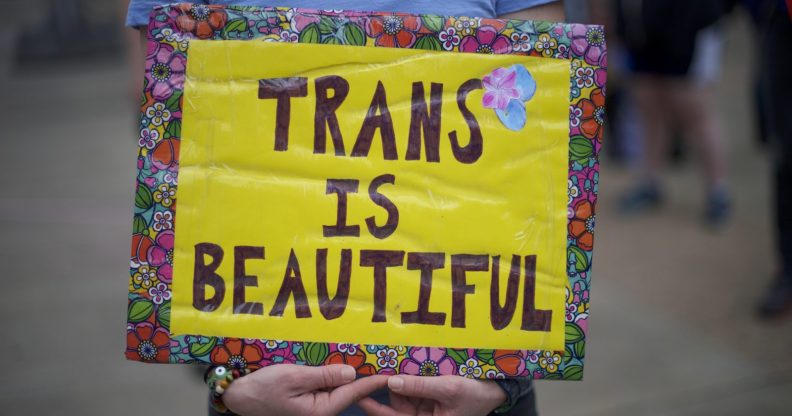Is this the beginning of the end for the anti-trans movement in the UK?

File photo. Protesters demonstrate during a rally against the transgender bathroom rights repeal at Thomas Paine Plaza February 25, 2017 in Philadelphia, Pennsylvania. (Mark Makela/Getty)
There’s been a lot of transphobia and anti-trans sentiment around recently.
From columnists likening the fight for trans equality with paedophiles to politicians and businessmen attempting to keep trans women out of women’s spaces, there has been a sense in the past few weeks that people with transphobic views are coming out of the shadows.
While trans and non-binary people are already painfully aware that many people treat us with distrust and disgust, at best, and hatred at worst, what’s been different lately is how this awareness has shifted into the mainstream.
People with transphobic views have been getting increasingly large platforms for their opinions. The “debate” – over trans people’s existence and rights; framed as whether we’re dangerous to women and children – has spilled over from the corners of the internet into the consciousness of society at large.
This is exactly what British transphobes have been demanding for years: an audience to listen attentively to their opinions on transgender people.
They call their opinions “feminism” or, at least, concern for the safety of women and girls. They say that trans people are silencing them.
And yet, in recent weeks, we’ve heard them loud and clear. We’ve heard them spout their views, unchallenged, on the floor of the House of Commons. In newspaper adverts, on the radio and on TV. People who back transgender rights have been called child abusers by “gender critical” activists; on the BBC, a straight white man compared doctors giving healthcare to transgender teenagers to Nazi doctors during the Holocaust; transgender women were branded “predatory men” so often that the harm caused is irreversible.
Frankly, it’s been pretty awful. But respected, high-profile people – household names, many of them – spouting transphobia, whether the covert or explicit kind, is not unusual.
What has been different this time is the reaction to it.
After The Guardian published another anti-trans editorial, it was as if an invisible line in the sand had been crossed – those who support trans people’s struggle for equality were furious. It was just the latest in a long line of articles from the paper framing trans people as a threat to women, but this time there was a backlash – and not just from trans people, exhausted at the relentless attack.
Hundreds of feminists wrote to the paper’s editor in protest. Then, thousands of people signed another open letter, calling out the paper’s “pattern” of publishing “abusive” articles about trans people. Soon after, more than 300 Guardian staff signed yet another letter, calling out the “pattern of transphobic content” in response to both the editorial line taken and the fact that a third trans person had quit the paper in less than a year.
We saw this reaction again when The Morning Star, another left-wing newspaper, published a vile, transphobic cartoon. The cartoon made the same comparison, between trans women and predatory men, that we’ve seen printed countless times in national newspapers.
But this time, the disgusting comparison wasn’t allowed to stand (and it wasn’t nominated for a prestigious journalism prize, as has happened before). After fierce criticism, the socialist paper was forced to apologise. The UK’s largest trade union, UNISON, wrote a letter slamming the editor’s decision to publish the transphobic cartoon in the first place.
And we saw unity from trans allies yet again when the Labour Campaign for Trans Rights called for transphobes to be expelled from the party. When anti-trans organisations responded by claiming they are “not transphobic”, senior Labour politicians doubled down on their support for the trans community.
When supporters of the anti-trans organisations heckled two women at a Labour leadership hustings, the leadership candidates responded by throwing their weight behind trans rights and outlining exactly why they care about fighting for trans people.
The spotlight on those with anti-trans views is exactly what they wanted.
But what’s been highlighted is that their views – as well as their alliances with homophobes, the religious right, white nationalists, and anti-abortion campaigners – are nothing more than what the New York Times this week called “a respectable bigotry“.
The platform given to those with “gender critical” views – on the left and the right of British society, in our media and in our government – has, rather than convincing wider society to join them in their weird crusade against trans people, exposed the cold truth of what they have long denied being: transphobic.
When you deny trans people rights, when you claim that we are dangerous, when you mock us and taunt us and organise against us, the lie that you are doing this in the name of women, or feminism, is now so self-evident that people have stopped swallowing it.
It’s been a long time coming. Trans people have been saying this for years.
What feels new is the sense that the light shone onto those with anti-trans views is only serving to rapidly increase the number of people standing with us, shoulder to shoulder, saying that those “gender critical” views are, as a judge ruled last December, “not worthy of respect in a democratic society“.
Unfortunately, the small, vocal lobby of transphobes in the UK isn’t going anywhere anytime soon. But what seems increasingly clear is that they’ve crossed a threshold past which there’s no turning back; past which it’s no longer possible for their fear and hatred of trans people to be plausibly denied.
There has been a lot of transphobia around recently. But, as we’re seeing, huge numbers of people now recognise these people and their bigoted views for exactly what they are.

